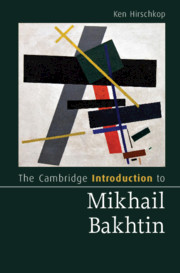2 results
Chapter 3 - Context
-
- Book:
- The Cambridge Introduction to Mikhail Bakhtin
- Published online:
- 21 October 2021
- Print publication:
- 04 November 2021, pp 30-58
-
- Chapter
- Export citation

The Cambridge Introduction to Mikhail Bakhtin
-
- Published online:
- 21 October 2021
- Print publication:
- 04 November 2021

